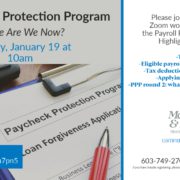Tax Misinformation on Social Media
In today’s age of social media, people can (and do) make videos and posts on nearly every imaginable topic. Unfortunately, when it comes to taxes, bad information spreads quickly — and it can be costly. Following the wrong advice or so-called “tax savings tips” from social media can open you up to IRS penalties, interest charges, audits, and even expose you to scams or identity theft. It can be difficult to judge online whether the person posting the advice is truly qualified to provide tax guidance.
Risks of Following Social Media Tax Advice
The dangers of false tax posts aren’t just theoretical. Acting on misinformation can have very real financial and legal consequences. Here are some of the biggest risks to be aware of:
- Filing false or misleading information to reduce your tax liability can trigger IRS penalties, back taxes, and interest when the discrepancies are discovered. In more serious cases, intentionally filing fraudulent returns can also result in civil or criminal charges.
- Providing your personal or banking information over social media can increase the chance of your data falling into the wrong hands. Scammers often pose as “helpers” and can use your details to commit identity theft or divert your refund.
Common Schemes Promoted on Social Media
These scams often share the same playbook: they promise big refunds or easy tax breaks while encouraging you to bend the rules. Here are some of the most common schemes making the rounds online:
- Creating fake businesses, rental properties, or other fictitious activities to generate losses and reduce taxable income.
- Recording false charitable contribution deductions on your return.
- Improperly claiming credits you don’t qualify for.
- Misusing legitimate IRS forms, such as Form W-2 or Form 8944, based on false claims circulating online. For example, one recent scheme told taxpayers they could use Form 8944 to get a refund even if they owed taxes. In reality, this form is only for tax professionals requesting an e-file waiver.
- Offering to assist in filing your return using one of these “money-saving” tricks, while requesting your personal information and bank details over social media.
Why Your Accountant’s Qualifications Matter
When it comes to taxes, credentials matter. The difference between a licensed professional and an online influencer can mean the difference between filing correctly and facing costly trouble with the IRS. Here’s what sets accountants apart:
- A Certified Public Accountant (CPA) has undergone years of education, passed rigorous exams, met strict experience requirements, and is certified by a state board of accountancy. They are also required to complete annual continuing education to stay current on tax law.
- In addition to their training, accountants have access to professional research tools, software, and peer networks to help them navigate complex tax issues.
Social Media/Influencers Qualifications for Providing Tax Advice
- Unknown
- Unverifiable
How to Protect Yourself
If something sounds too good to be true, it probably is. Instead of relying on social media:
- Use IRS.gov, reputable tax software, or official IRS social media accounts to fact-check information.
- Verify a preparer’s credentials before hiring them. Look for a valid Preparer Tax Identification Number (PTIN) and check reviews or complaints.
- Report suspected scams or abusive tax schemes to the IRS using Form 14242 or other official channels.
Following tax tips from social media can lead to serious and long-lasting consequences. Don’t risk your financial stability by trusting unverified online advice. If you have questions about tax-saving strategies, the safest choice is to reach out to a Certified Public Accountant (Leone, McDonnell & Roberts) or your trusted tax accountant who can provide reliable, personalized guidance.










